NRSG139 Integrating Practice 1: Rapport in Health Assessment Interview
VerifiedAdded on 2022/08/24
|6
|1322
|38
Report
AI Summary
This report delves into the critical role of rapport in nursing practice, focusing on the establishment and maintenance of a therapeutic relationship between nurses and patients. It explores the various considerations that impact rapport, such as patient's physical, mental, socio-economic, and cultural backgrounds, emphasizing the importance of personalized and ethical care. The report outlines specific techniques for building trust and effective communication, including active listening, verbal and non-verbal communication, and cultural sensitivity. Furthermore, it examines effective questioning techniques essential for conducting health assessments, highlighting the use of open-ended and closed-ended questions, along with the importance of privacy, respect, and understanding. The conclusion underscores the significance of good rapport in facilitating physical and emotional healing, ultimately leading to improved patient outcomes.
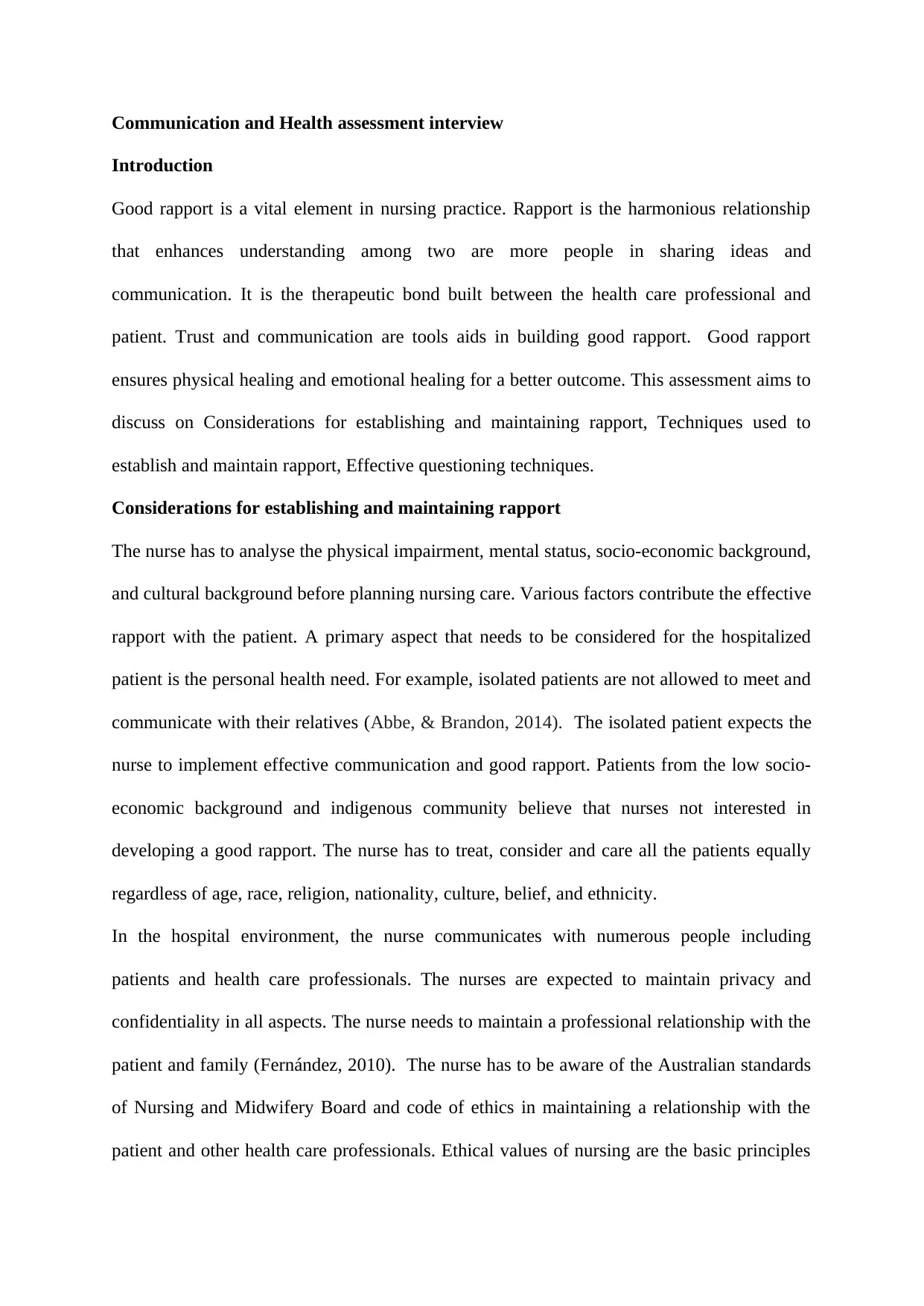
Communication and Health assessment interview
Introduction
Good rapport is a vital element in nursing practice. Rapport is the harmonious relationship
that enhances understanding among two are more people in sharing ideas and
communication. It is the therapeutic bond built between the health care professional and
patient. Trust and communication are tools aids in building good rapport. Good rapport
ensures physical healing and emotional healing for a better outcome. This assessment aims to
discuss on Considerations for establishing and maintaining rapport, Techniques used to
establish and maintain rapport, Effective questioning techniques.
Considerations for establishing and maintaining rapport
The nurse has to analyse the physical impairment, mental status, socio-economic background,
and cultural background before planning nursing care. Various factors contribute the effective
rapport with the patient. A primary aspect that needs to be considered for the hospitalized
patient is the personal health need. For example, isolated patients are not allowed to meet and
communicate with their relatives (Abbe, & Brandon, 2014). The isolated patient expects the
nurse to implement effective communication and good rapport. Patients from the low socio-
economic background and indigenous community believe that nurses not interested in
developing a good rapport. The nurse has to treat, consider and care all the patients equally
regardless of age, race, religion, nationality, culture, belief, and ethnicity.
In the hospital environment, the nurse communicates with numerous people including
patients and health care professionals. The nurses are expected to maintain privacy and
confidentiality in all aspects. The nurse needs to maintain a professional relationship with the
patient and family (Fernández, 2010). The nurse has to be aware of the Australian standards
of Nursing and Midwifery Board and code of ethics in maintaining a relationship with the
patient and other health care professionals. Ethical values of nursing are the basic principles
Introduction
Good rapport is a vital element in nursing practice. Rapport is the harmonious relationship
that enhances understanding among two are more people in sharing ideas and
communication. It is the therapeutic bond built between the health care professional and
patient. Trust and communication are tools aids in building good rapport. Good rapport
ensures physical healing and emotional healing for a better outcome. This assessment aims to
discuss on Considerations for establishing and maintaining rapport, Techniques used to
establish and maintain rapport, Effective questioning techniques.
Considerations for establishing and maintaining rapport
The nurse has to analyse the physical impairment, mental status, socio-economic background,
and cultural background before planning nursing care. Various factors contribute the effective
rapport with the patient. A primary aspect that needs to be considered for the hospitalized
patient is the personal health need. For example, isolated patients are not allowed to meet and
communicate with their relatives (Abbe, & Brandon, 2014). The isolated patient expects the
nurse to implement effective communication and good rapport. Patients from the low socio-
economic background and indigenous community believe that nurses not interested in
developing a good rapport. The nurse has to treat, consider and care all the patients equally
regardless of age, race, religion, nationality, culture, belief, and ethnicity.
In the hospital environment, the nurse communicates with numerous people including
patients and health care professionals. The nurses are expected to maintain privacy and
confidentiality in all aspects. The nurse needs to maintain a professional relationship with the
patient and family (Fernández, 2010). The nurse has to be aware of the Australian standards
of Nursing and Midwifery Board and code of ethics in maintaining a relationship with the
patient and other health care professionals. Ethical values of nursing are the basic principles
Paraphrase This Document
Need a fresh take? Get an instant paraphrase of this document with our AI Paraphraser
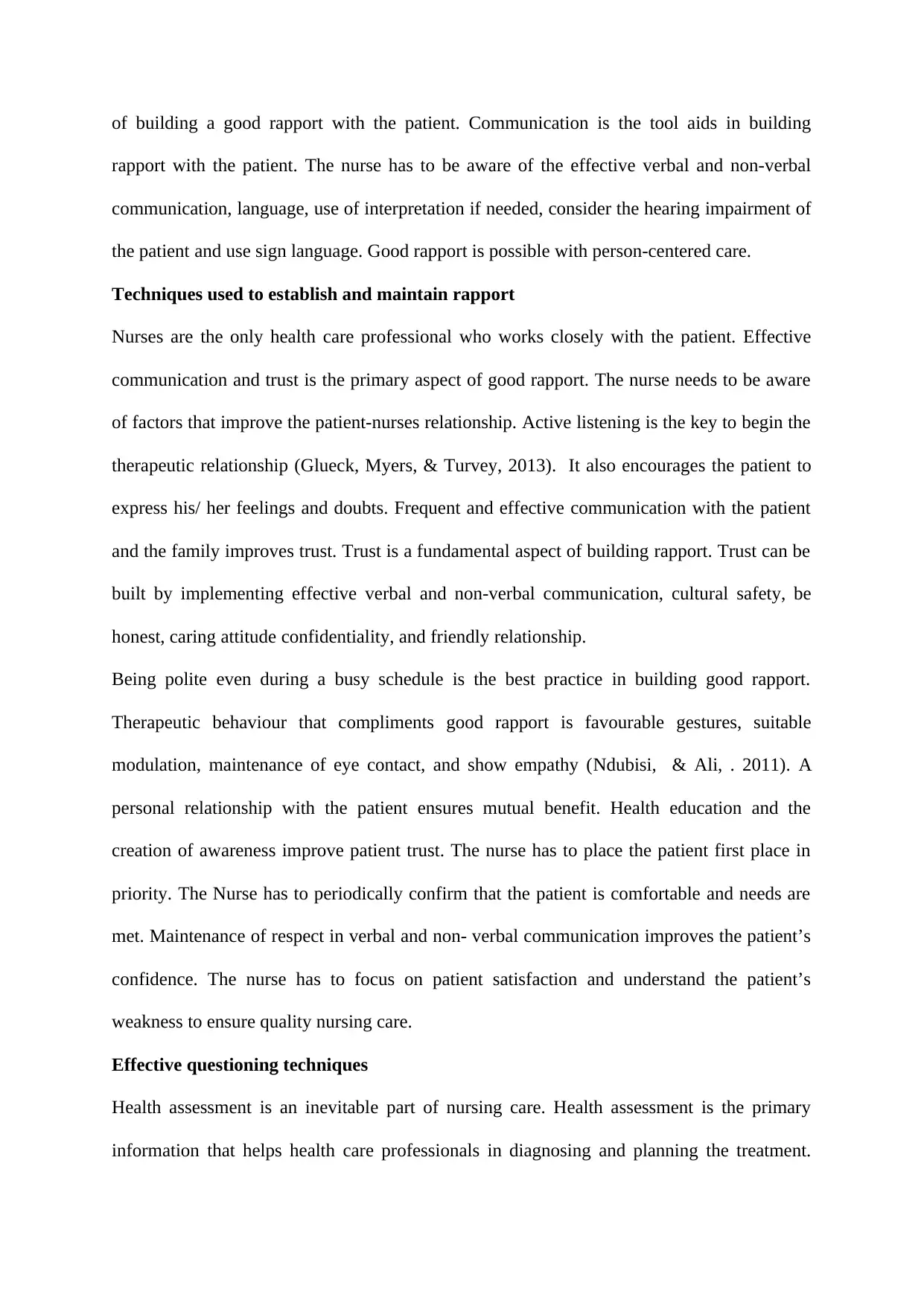
of building a good rapport with the patient. Communication is the tool aids in building
rapport with the patient. The nurse has to be aware of the effective verbal and non-verbal
communication, language, use of interpretation if needed, consider the hearing impairment of
the patient and use sign language. Good rapport is possible with person-centered care.
Techniques used to establish and maintain rapport
Nurses are the only health care professional who works closely with the patient. Effective
communication and trust is the primary aspect of good rapport. The nurse needs to be aware
of factors that improve the patient-nurses relationship. Active listening is the key to begin the
therapeutic relationship (Glueck, Myers, & Turvey, 2013). It also encourages the patient to
express his/ her feelings and doubts. Frequent and effective communication with the patient
and the family improves trust. Trust is a fundamental aspect of building rapport. Trust can be
built by implementing effective verbal and non-verbal communication, cultural safety, be
honest, caring attitude confidentiality, and friendly relationship.
Being polite even during a busy schedule is the best practice in building good rapport.
Therapeutic behaviour that compliments good rapport is favourable gestures, suitable
modulation, maintenance of eye contact, and show empathy (Ndubisi, & Ali, . 2011). A
personal relationship with the patient ensures mutual benefit. Health education and the
creation of awareness improve patient trust. The nurse has to place the patient first place in
priority. The Nurse has to periodically confirm that the patient is comfortable and needs are
met. Maintenance of respect in verbal and non- verbal communication improves the patient’s
confidence. The nurse has to focus on patient satisfaction and understand the patient’s
weakness to ensure quality nursing care.
Effective questioning techniques
Health assessment is an inevitable part of nursing care. Health assessment is the primary
information that helps health care professionals in diagnosing and planning the treatment.
rapport with the patient. The nurse has to be aware of the effective verbal and non-verbal
communication, language, use of interpretation if needed, consider the hearing impairment of
the patient and use sign language. Good rapport is possible with person-centered care.
Techniques used to establish and maintain rapport
Nurses are the only health care professional who works closely with the patient. Effective
communication and trust is the primary aspect of good rapport. The nurse needs to be aware
of factors that improve the patient-nurses relationship. Active listening is the key to begin the
therapeutic relationship (Glueck, Myers, & Turvey, 2013). It also encourages the patient to
express his/ her feelings and doubts. Frequent and effective communication with the patient
and the family improves trust. Trust is a fundamental aspect of building rapport. Trust can be
built by implementing effective verbal and non-verbal communication, cultural safety, be
honest, caring attitude confidentiality, and friendly relationship.
Being polite even during a busy schedule is the best practice in building good rapport.
Therapeutic behaviour that compliments good rapport is favourable gestures, suitable
modulation, maintenance of eye contact, and show empathy (Ndubisi, & Ali, . 2011). A
personal relationship with the patient ensures mutual benefit. Health education and the
creation of awareness improve patient trust. The nurse has to place the patient first place in
priority. The Nurse has to periodically confirm that the patient is comfortable and needs are
met. Maintenance of respect in verbal and non- verbal communication improves the patient’s
confidence. The nurse has to focus on patient satisfaction and understand the patient’s
weakness to ensure quality nursing care.
Effective questioning techniques
Health assessment is an inevitable part of nursing care. Health assessment is the primary
information that helps health care professionals in diagnosing and planning the treatment.
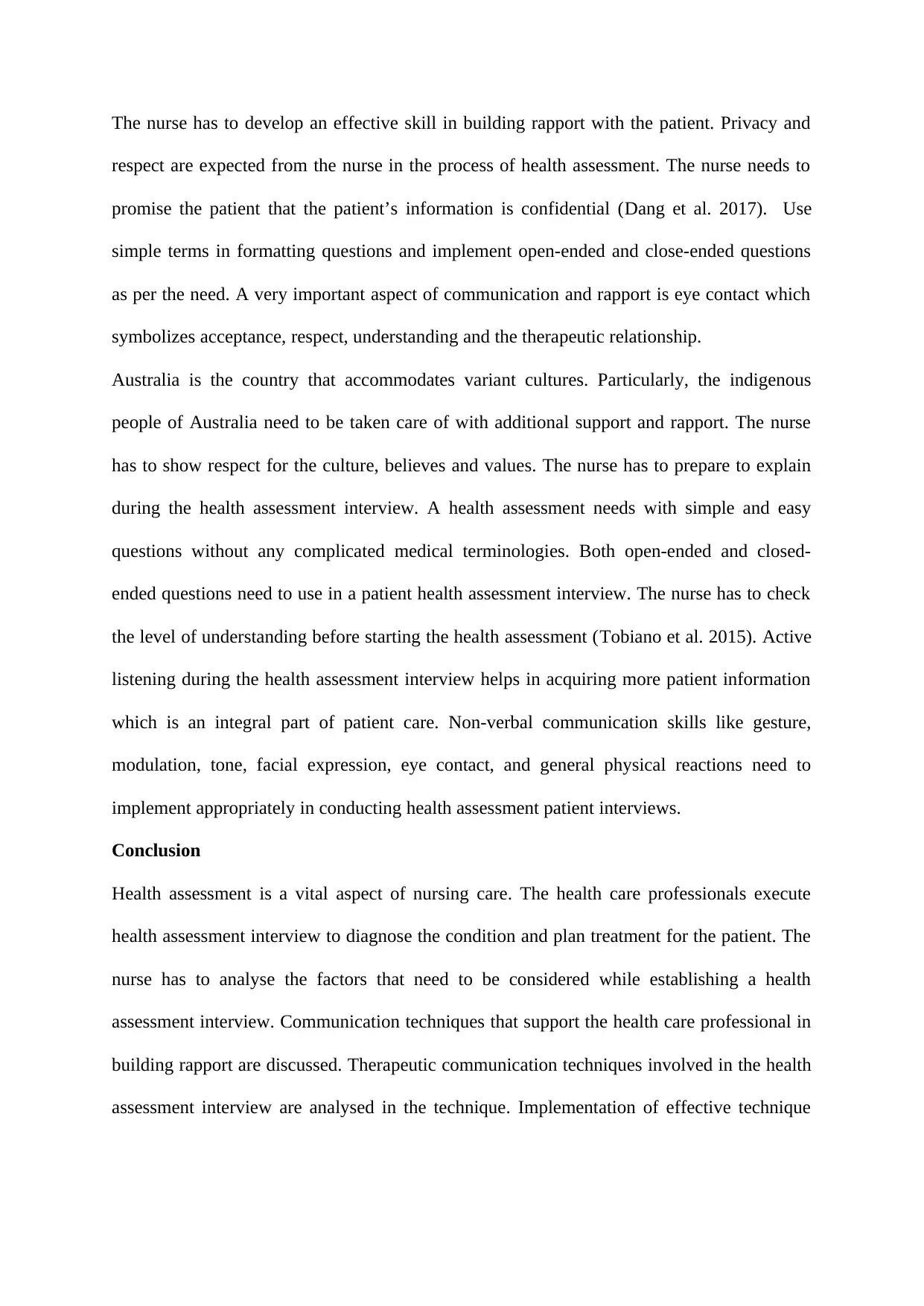
The nurse has to develop an effective skill in building rapport with the patient. Privacy and
respect are expected from the nurse in the process of health assessment. The nurse needs to
promise the patient that the patient’s information is confidential (Dang et al. 2017). Use
simple terms in formatting questions and implement open-ended and close-ended questions
as per the need. A very important aspect of communication and rapport is eye contact which
symbolizes acceptance, respect, understanding and the therapeutic relationship.
Australia is the country that accommodates variant cultures. Particularly, the indigenous
people of Australia need to be taken care of with additional support and rapport. The nurse
has to show respect for the culture, believes and values. The nurse has to prepare to explain
during the health assessment interview. A health assessment needs with simple and easy
questions without any complicated medical terminologies. Both open-ended and closed-
ended questions need to use in a patient health assessment interview. The nurse has to check
the level of understanding before starting the health assessment (Tobiano et al. 2015). Active
listening during the health assessment interview helps in acquiring more patient information
which is an integral part of patient care. Non-verbal communication skills like gesture,
modulation, tone, facial expression, eye contact, and general physical reactions need to
implement appropriately in conducting health assessment patient interviews.
Conclusion
Health assessment is a vital aspect of nursing care. The health care professionals execute
health assessment interview to diagnose the condition and plan treatment for the patient. The
nurse has to analyse the factors that need to be considered while establishing a health
assessment interview. Communication techniques that support the health care professional in
building rapport are discussed. Therapeutic communication techniques involved in the health
assessment interview are analysed in the technique. Implementation of effective technique
respect are expected from the nurse in the process of health assessment. The nurse needs to
promise the patient that the patient’s information is confidential (Dang et al. 2017). Use
simple terms in formatting questions and implement open-ended and close-ended questions
as per the need. A very important aspect of communication and rapport is eye contact which
symbolizes acceptance, respect, understanding and the therapeutic relationship.
Australia is the country that accommodates variant cultures. Particularly, the indigenous
people of Australia need to be taken care of with additional support and rapport. The nurse
has to show respect for the culture, believes and values. The nurse has to prepare to explain
during the health assessment interview. A health assessment needs with simple and easy
questions without any complicated medical terminologies. Both open-ended and closed-
ended questions need to use in a patient health assessment interview. The nurse has to check
the level of understanding before starting the health assessment (Tobiano et al. 2015). Active
listening during the health assessment interview helps in acquiring more patient information
which is an integral part of patient care. Non-verbal communication skills like gesture,
modulation, tone, facial expression, eye contact, and general physical reactions need to
implement appropriately in conducting health assessment patient interviews.
Conclusion
Health assessment is a vital aspect of nursing care. The health care professionals execute
health assessment interview to diagnose the condition and plan treatment for the patient. The
nurse has to analyse the factors that need to be considered while establishing a health
assessment interview. Communication techniques that support the health care professional in
building rapport are discussed. Therapeutic communication techniques involved in the health
assessment interview are analysed in the technique. Implementation of effective technique
⊘ This is a preview!⊘
Do you want full access?
Subscribe today to unlock all pages.

Trusted by 1+ million students worldwide
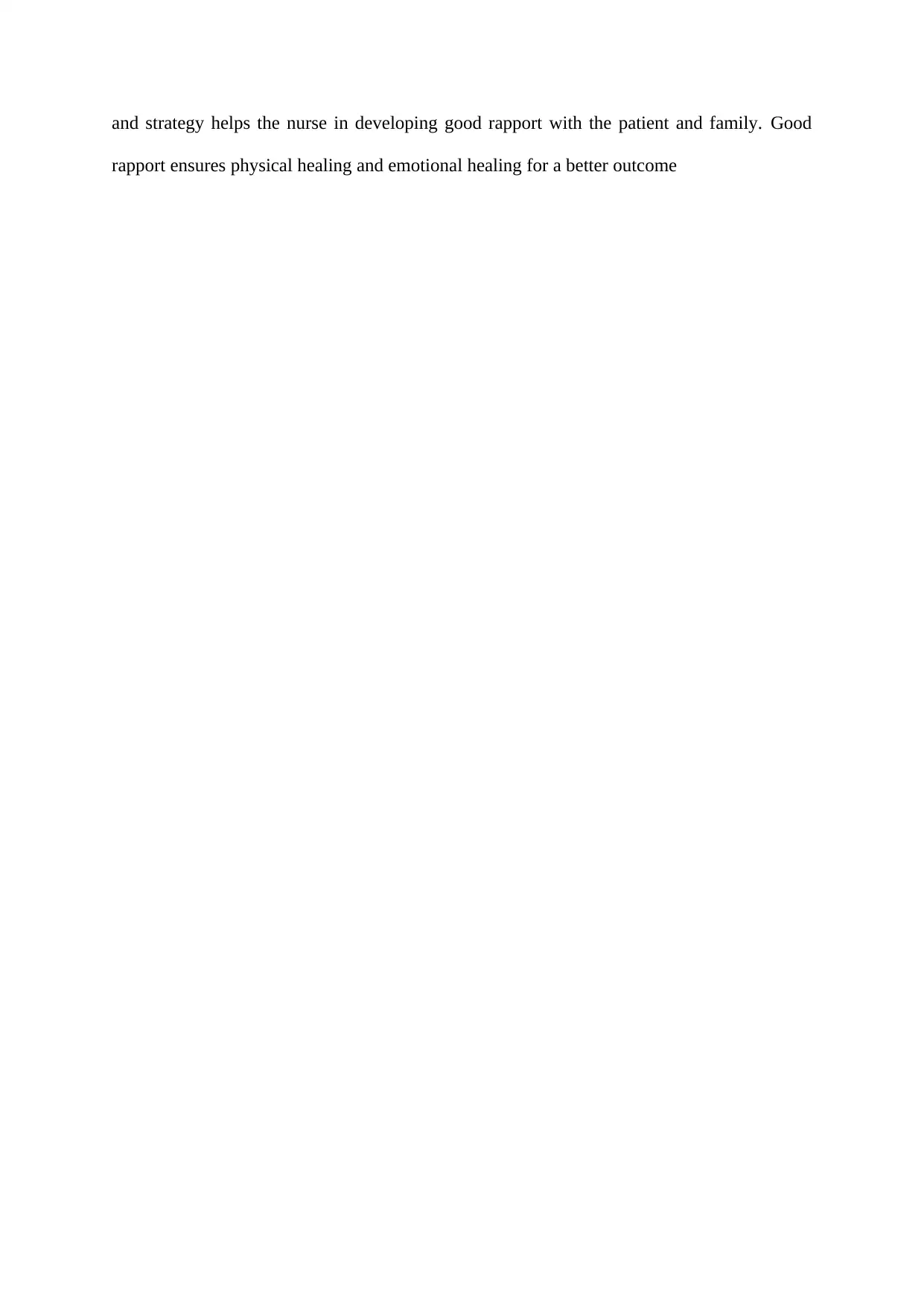
and strategy helps the nurse in developing good rapport with the patient and family. Good
rapport ensures physical healing and emotional healing for a better outcome
rapport ensures physical healing and emotional healing for a better outcome
Paraphrase This Document
Need a fresh take? Get an instant paraphrase of this document with our AI Paraphraser
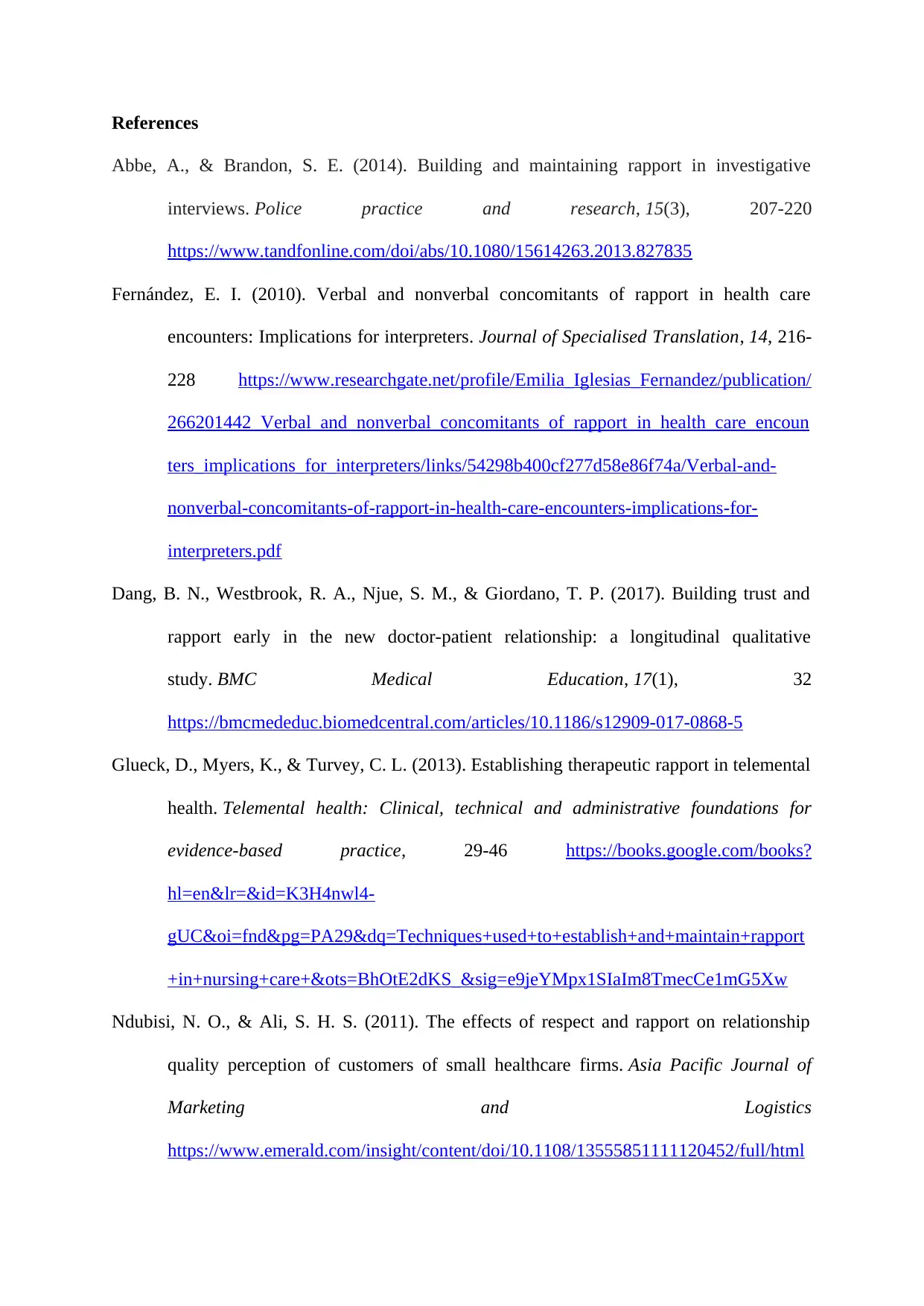
References
Abbe, A., & Brandon, S. E. (2014). Building and maintaining rapport in investigative
interviews. Police practice and research, 15(3), 207-220
https://www.tandfonline.com/doi/abs/10.1080/15614263.2013.827835
Fernández, E. I. (2010). Verbal and nonverbal concomitants of rapport in health care
encounters: Implications for interpreters. Journal of Specialised Translation, 14, 216-
228 https://www.researchgate.net/profile/Emilia_Iglesias_Fernandez/publication/
266201442_Verbal_and_nonverbal_concomitants_of_rapport_in_health_care_encoun
ters_implications_for_interpreters/links/54298b400cf277d58e86f74a/Verbal-and-
nonverbal-concomitants-of-rapport-in-health-care-encounters-implications-for-
interpreters.pdf
Dang, B. N., Westbrook, R. A., Njue, S. M., & Giordano, T. P. (2017). Building trust and
rapport early in the new doctor-patient relationship: a longitudinal qualitative
study. BMC Medical Education, 17(1), 32
https://bmcmededuc.biomedcentral.com/articles/10.1186/s12909-017-0868-5
Glueck, D., Myers, K., & Turvey, C. L. (2013). Establishing therapeutic rapport in telemental
health. Telemental health: Clinical, technical and administrative foundations for
evidence-based practice, 29-46 https://books.google.com/books?
hl=en&lr=&id=K3H4nwl4-
gUC&oi=fnd&pg=PA29&dq=Techniques+used+to+establish+and+maintain+rapport
+in+nursing+care+&ots=BhOtE2dKS_&sig=e9jeYMpx1SIaIm8TmecCe1mG5Xw
Ndubisi, N. O., & Ali, S. H. S. (2011). The effects of respect and rapport on relationship
quality perception of customers of small healthcare firms. Asia Pacific Journal of
Marketing and Logistics
https://www.emerald.com/insight/content/doi/10.1108/13555851111120452/full/html
Abbe, A., & Brandon, S. E. (2014). Building and maintaining rapport in investigative
interviews. Police practice and research, 15(3), 207-220
https://www.tandfonline.com/doi/abs/10.1080/15614263.2013.827835
Fernández, E. I. (2010). Verbal and nonverbal concomitants of rapport in health care
encounters: Implications for interpreters. Journal of Specialised Translation, 14, 216-
228 https://www.researchgate.net/profile/Emilia_Iglesias_Fernandez/publication/
266201442_Verbal_and_nonverbal_concomitants_of_rapport_in_health_care_encoun
ters_implications_for_interpreters/links/54298b400cf277d58e86f74a/Verbal-and-
nonverbal-concomitants-of-rapport-in-health-care-encounters-implications-for-
interpreters.pdf
Dang, B. N., Westbrook, R. A., Njue, S. M., & Giordano, T. P. (2017). Building trust and
rapport early in the new doctor-patient relationship: a longitudinal qualitative
study. BMC Medical Education, 17(1), 32
https://bmcmededuc.biomedcentral.com/articles/10.1186/s12909-017-0868-5
Glueck, D., Myers, K., & Turvey, C. L. (2013). Establishing therapeutic rapport in telemental
health. Telemental health: Clinical, technical and administrative foundations for
evidence-based practice, 29-46 https://books.google.com/books?
hl=en&lr=&id=K3H4nwl4-
gUC&oi=fnd&pg=PA29&dq=Techniques+used+to+establish+and+maintain+rapport
+in+nursing+care+&ots=BhOtE2dKS_&sig=e9jeYMpx1SIaIm8TmecCe1mG5Xw
Ndubisi, N. O., & Ali, S. H. S. (2011). The effects of respect and rapport on relationship
quality perception of customers of small healthcare firms. Asia Pacific Journal of
Marketing and Logistics
https://www.emerald.com/insight/content/doi/10.1108/13555851111120452/full/html
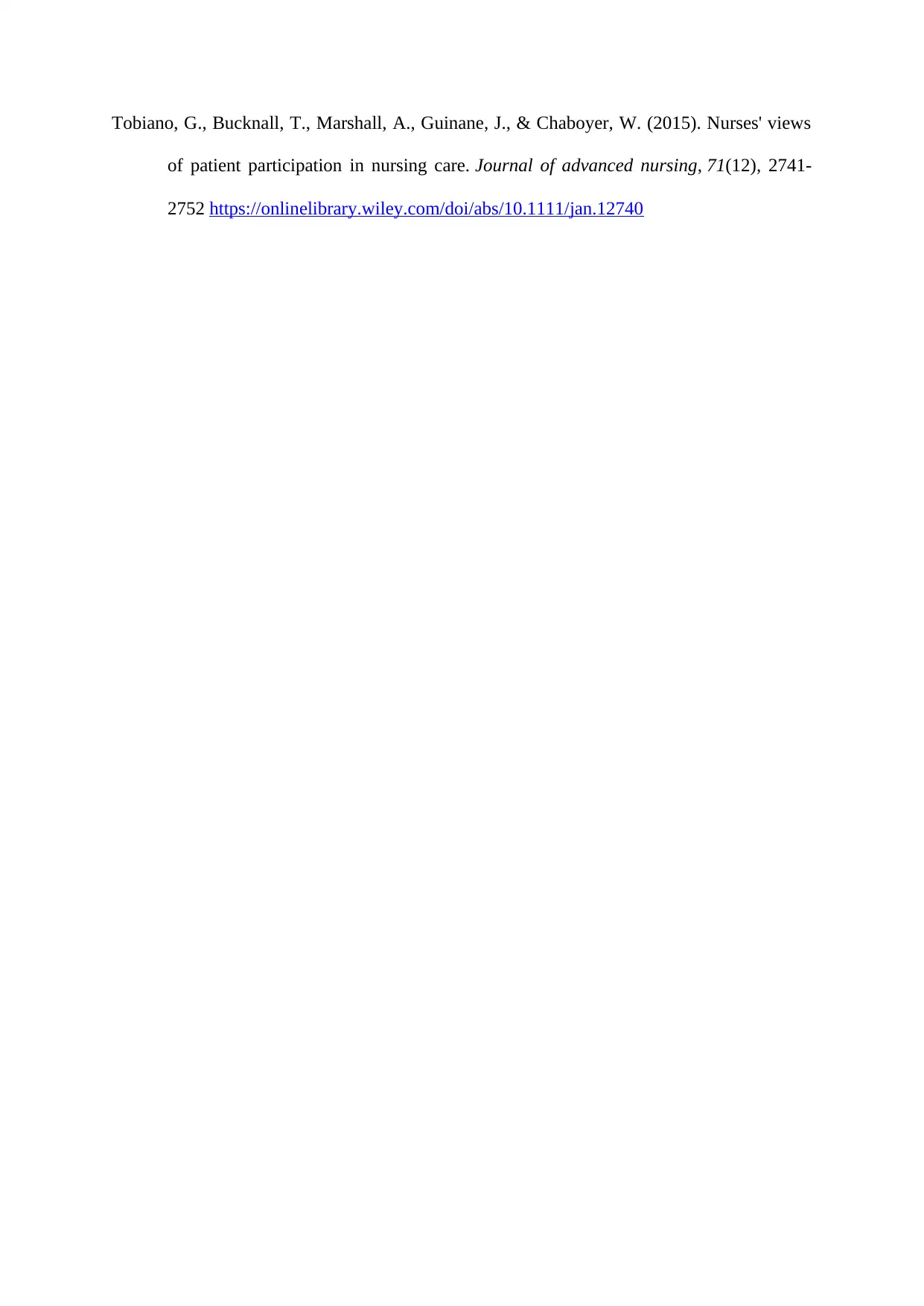
Tobiano, G., Bucknall, T., Marshall, A., Guinane, J., & Chaboyer, W. (2015). Nurses' views
of patient participation in nursing care. Journal of advanced nursing, 71(12), 2741-
2752 https://onlinelibrary.wiley.com/doi/abs/10.1111/jan.12740
of patient participation in nursing care. Journal of advanced nursing, 71(12), 2741-
2752 https://onlinelibrary.wiley.com/doi/abs/10.1111/jan.12740
⊘ This is a preview!⊘
Do you want full access?
Subscribe today to unlock all pages.

Trusted by 1+ million students worldwide
1 out of 6
Related Documents
Your All-in-One AI-Powered Toolkit for Academic Success.
+13062052269
info@desklib.com
Available 24*7 on WhatsApp / Email
![[object Object]](/_next/static/media/star-bottom.7253800d.svg)
Unlock your academic potential
Copyright © 2020–2025 A2Z Services. All Rights Reserved. Developed and managed by ZUCOL.





